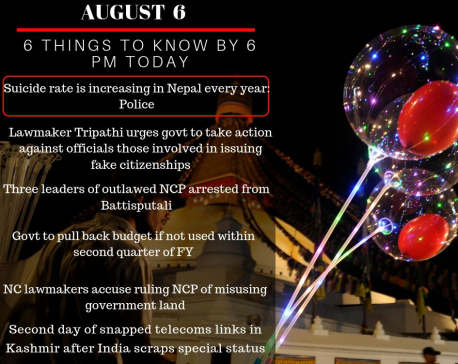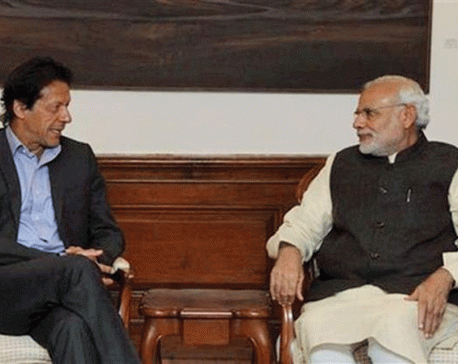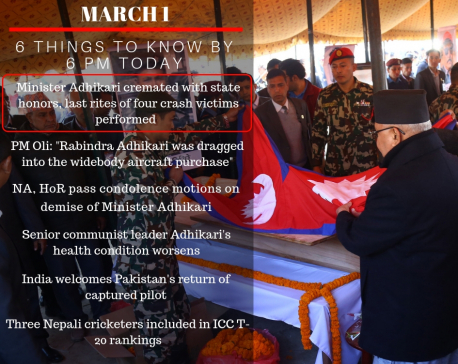
OR
Exercise restraint, reduce hostility
Published On: February 27, 2019 02:00 AM NPT By: Republica | @RepublicaNepal
Disturbing reports are coming from Kashmir. Indian media are flooded with news of airstrikes at training camp of Jaish-e-Mohammad (JeM) group in Balakot, Pakistan’s north-western Khyber Pakhtunkhwa province, which lies around 190 kilometers from Pakistani capital Islamabad. Pakistan has claimed that the strikes hit an empty area but “vowed to respond.” It appears that South Asian nuclear powers are in confrontational mode since the suicide attack on February 14 in Pulwama in Indian-administered Kashmir, which killed more than 40 Indian troops. India has accused Pakistan of allowing militant groups to operate on its territory and pointed finger at Pakistani security agencies for playing a role in that deadly attack. Pakistan, on the other hand, has refuted the Indian claim and says it provides no safe haven to any terrorist groups. There are fears that tensions that escalated since February 14 might end into a full blown war. Despite being hostile to each other, the two nations had refrained from air strikes across the line of control (LoC) since 1971.
There are claims and counterclaims regarding Tuesday’s airstrikes. While Indian Foreign Secretary Vijay Gokhale says the strikes have killed a “large number” of militants, including commanders, Pakistan’s army spokesman Major General Asif Ghafoor has rubbished the claim. Kashmir has remained a bone of contention between India and Pakistan ever since 1947. Both the countries claim all of Muslim-majority Kashmir and they have fought three wars since 1947. Kashmir is boiling again. Fearing the full-scale war, civilians have reportedly started stockpiling food and crowding petrol pumps, sending panic in the region. Some have even accused ruling Bharatiya Janata Party of capitalizing on Kashmir issue to win votes for upcoming elections. At this hour of tensions, India and Pakistan need to exercise utmost restraint and find ways to resolve their contentious issues, for the war between these two nations will not only harm them but will also have serious ramifications across South Asia.
Instead of saber rattling, India and Pakistan should immediately sit for talks. Both the countries have charismatic leaders in driving seats. Prime Minister Narendra Modi and his Pakistani counterpart Imran Khan are capable of reaching a sustainable solution. But for this both sides need to denounce terrorism and express commitment to lasting peace. Attack and counterattack and jingoistic posture will fuel fire to already sensitive and fragile relations between the two countries. We fear that first casualty of Indo-Pak conflict will be SAARC, the regional body that was established to maintain peace, eradicate poverty and accelerate development in the region. SAARC process has already been uncertain. Nepal, as a chair of SAARC, should also appeal the two countries to resolve their differences through dialogues. It does not require reminding leaders of Pakistan and India that war breeds war and it will take us nowhere. Peace is what Pakistan and India need. The two nations, we believe, are sensitive enough to understand the gravity of this matter.
You May Like This

Aug 6: 6 things to know by 6 PM today
Your daily dose of missed important news of the day. ... Read More...

Trouble in the neighborhood
Today most countries in the world are affected by terrorism. India and Pakistan are no exceptions. Pakistan has been blamed... Read More...

March 1: 6 things to know by 6 PM today
Your daily dose of missed important news of the day. ... Read More...




Just In
- Fixing a win by outlawing dissent damages democracy
- MoHP cautions docs working in govt hospitals not to work in private ones
- Over 400,000 tourists visited Mustang by road last year
- 19 hydropower projects to be showcased at investment summit
- Global oil and gold prices surge as Israel retaliates against Iran
- Sajha Yatayat cancels CEO appointment process for lack of candidates
- Govt padlocks Nepal Scouts’ property illegally occupied by NC lawmaker Deepak Khadka
- FWEAN meets with President Paudel to solicit support for women entrepreneurship







_20220508065243.jpg)





Leave A Comment